One of the series I’m always trying to draw friends into is Akimi Yoshida’s classic shojo manga, Banana Fish. I first discovered this series, embarrassingly, through wikipedia, as I was trying to find shojo manga that I could really enjoy. It was this entry that piqued my interested in the series, citing a quote from Frederik L. Schodt, which described Banana Fish as “…one of the few girls’ manga a red-blooded Japanese male adult could admit to reading without blushing.” Right around the same time, mention of Banana Fish began turning up in interviews with Jason Thompson, just before the publication of his book, Manga: The Complete Guide, and though I don’t remember exactly what he said about it back then, it had the effect of spurring my interest into action, and before I knew it, I began buying the series.
I’m certainly not the only person who has tried to generate interest in Banana Fish. Shaenon Garrity made it part of her awesome Overlooked Manga Festival (one of my very favorites of that series so far), and to my mind, no further persuasion should be needed. Still, I find Banana Fish is a tough sell with friends. There’s no way to effectively preview the series, as it is difficult to find in libraries or brick and mortar bookstores. There are not even fan scanlations available to view. Anyone who wants to jump into this series pretty much has to commit to buying at least one book they may not end up liking, and I’ve found just a few who are willing to risk that. I’m going to try here to build on the case that Shaenon Garrity has already made for this series, with hope that even just one more person might choose to take that risk.
It was volume seven that changed everything for me. I wrote about it in my fannish journal at the time, and I’ll reprint some of what I said here:
I thought I knew what this manga was, and suddenly I don’t anymore. Like. It was this great, stylized, old-American-cop-show-with-S.E. Hinton-gang-melodrama-on-the-side thing, and it was really enjoyable like that. And now suddenly it is also really funny in totally unexpected places. And kind of tender. In a non-melodramatic way. And if I thought I couldn’t love Eiji more, I was wrong. He makes a joke about gourds. Which for some reason is the funniest thing I’ve ever read. Shaenon Garrity said in her Overlooked Manga Festival write-up that BF starts off slow but “pays off huge in the later volumes.” She was talking about the plot, but I think it applies all around. I had no idea.
Quick notes: Ash Lynx is a teenage gang leader in 1980’s New York (as imagined by a 1980’s Japanese mangaka). He’s a pretty boy (this is brought up constantly), and won his turf through many hellish years as the boy toy of mob leader Papa Dino Golzine, with whom he has since broken ties. Papa Dino put a lot of money into developing a drug called “Banana Fish” that drives people to murderous fits until they eventually kill themselves. Ash knows about this. He is in deep shit, but since he’s feared by almost everyone, he’s getting by. Eiji Okumura is a former Japanese athlete, who, after suffering injury, has come to the states as a photographer’s assistant on assignment to research American gangs. He’s very innocent and young-looking for his age (19). He’s gotten swept up into all this madness, and has been on the run with Ash, who is inexplicably driven to protect him.
What I’m going to do right now is try, through one section of volume seven, give you an idea of the utter adorableness of Eiji, and the equally adorable way his friendship with Ash has evolved.
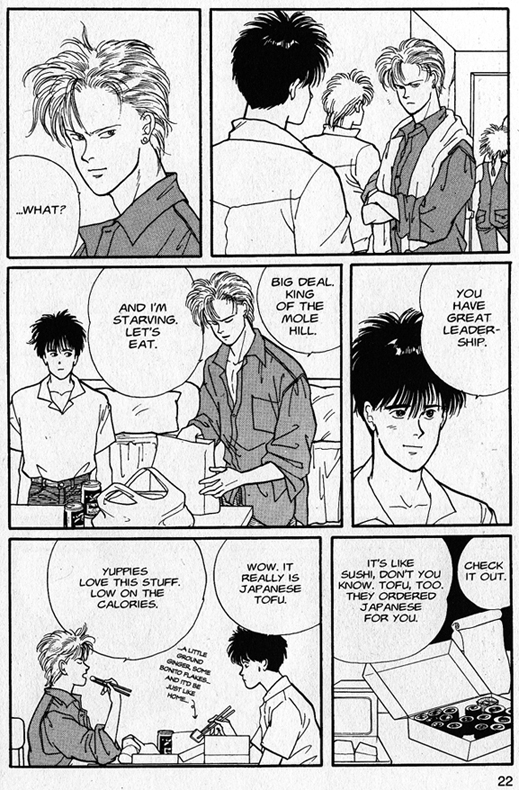
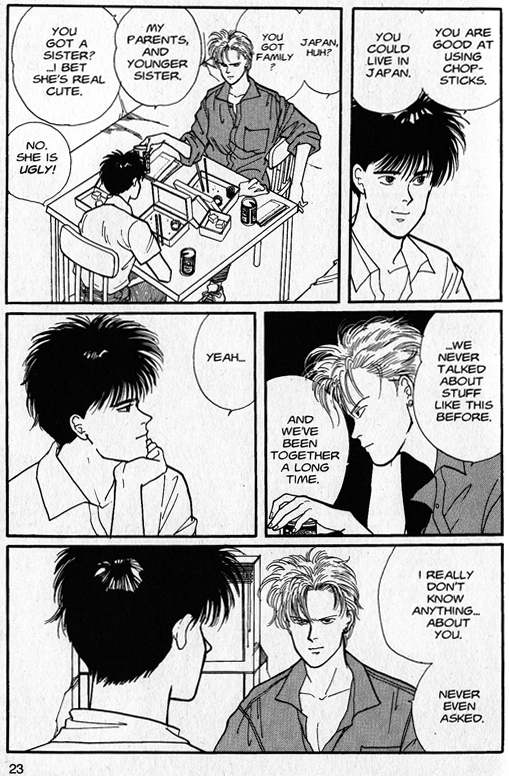
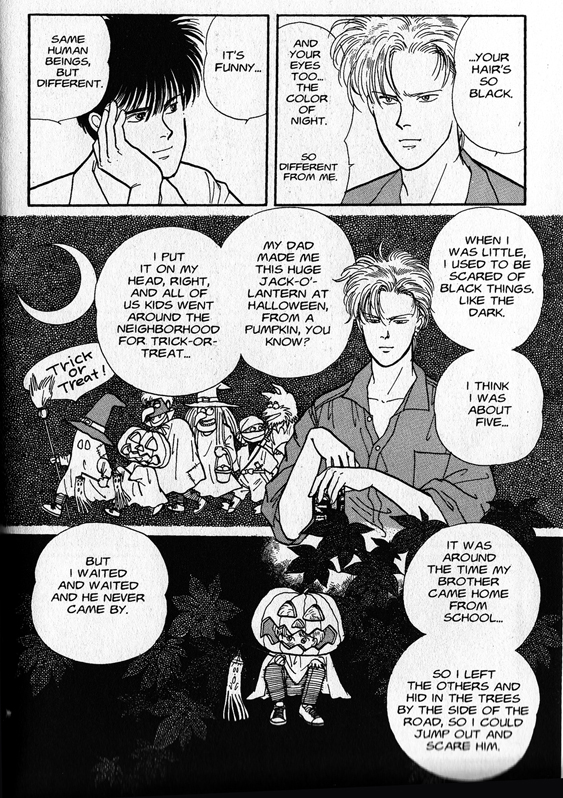
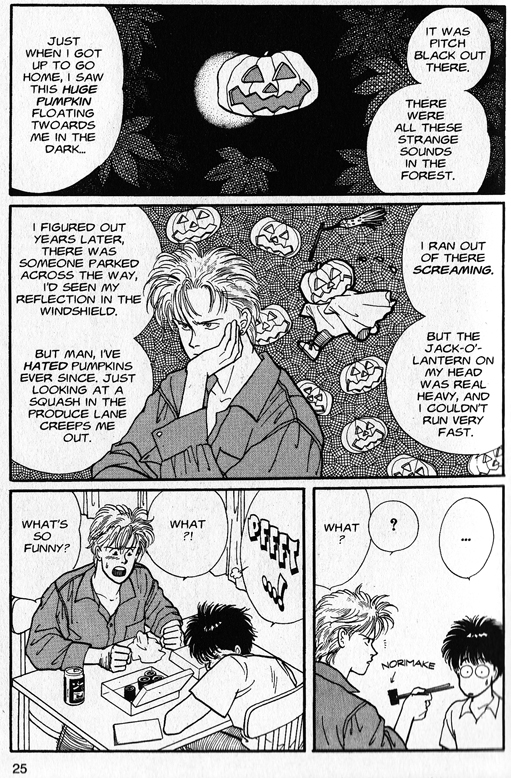
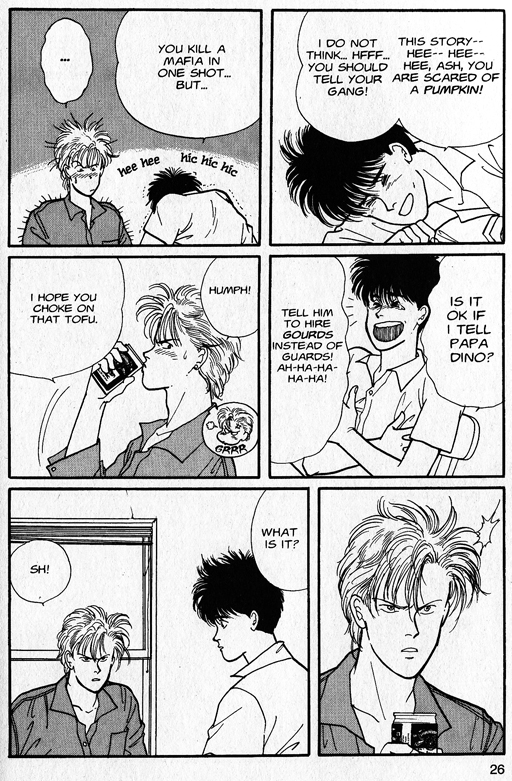
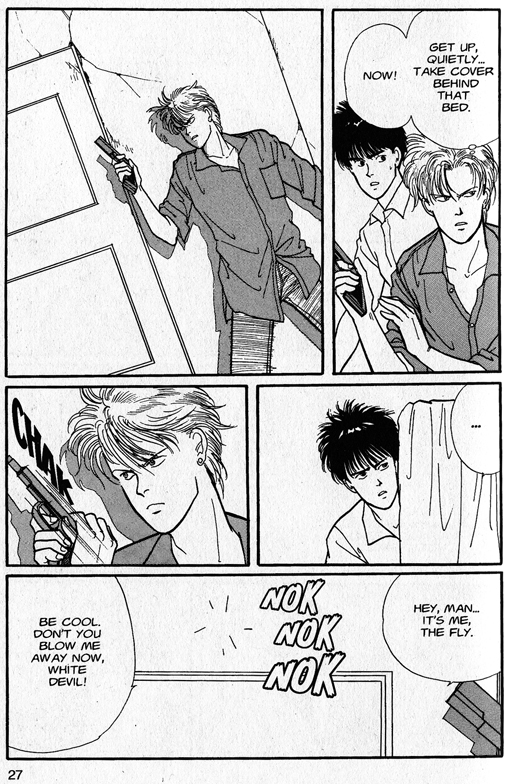
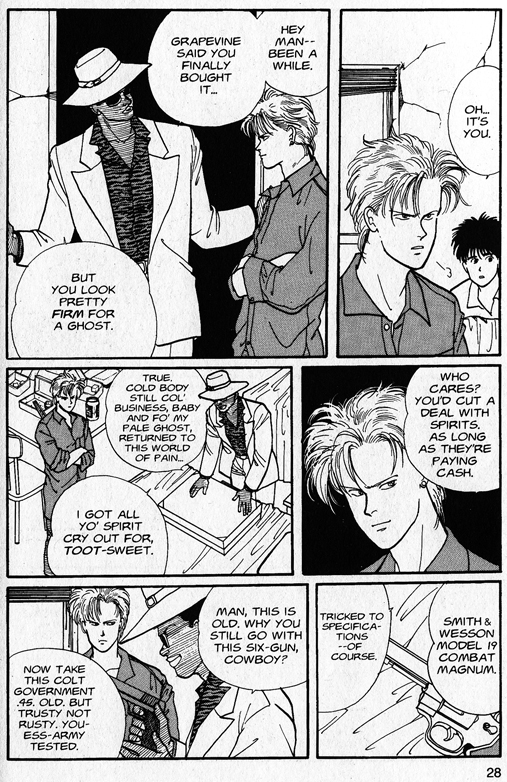
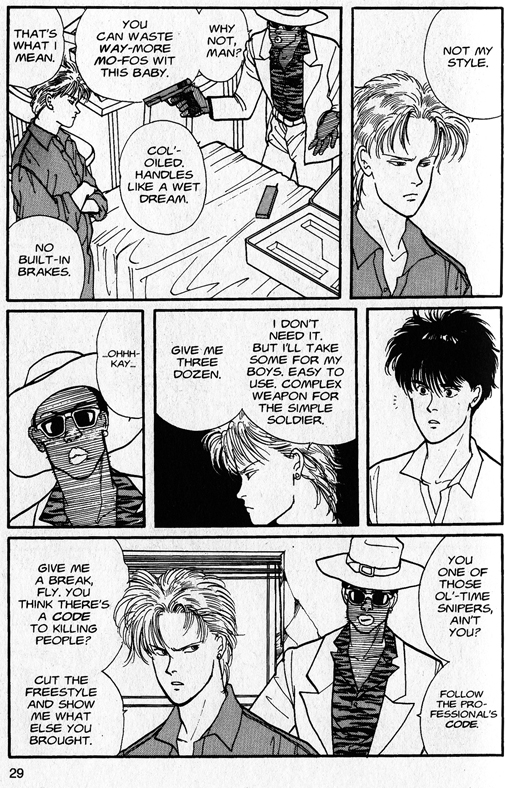
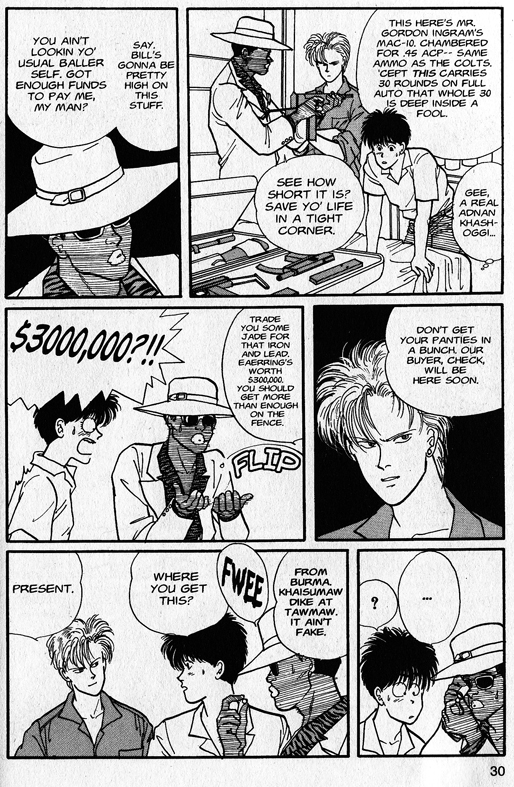
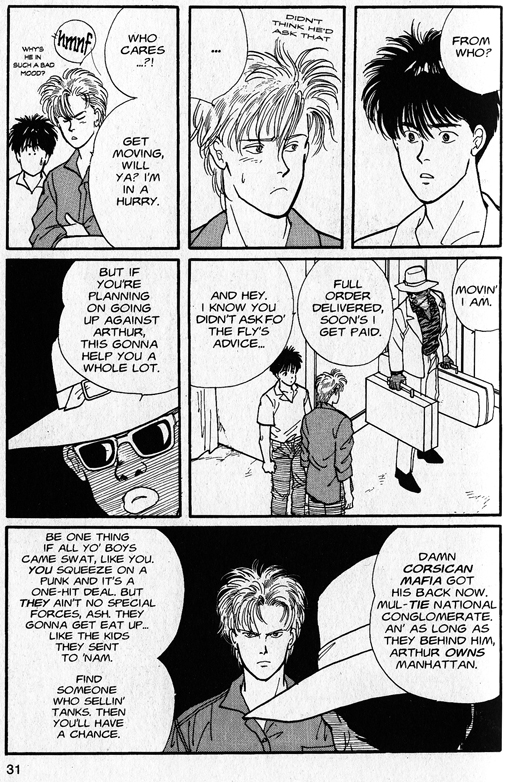
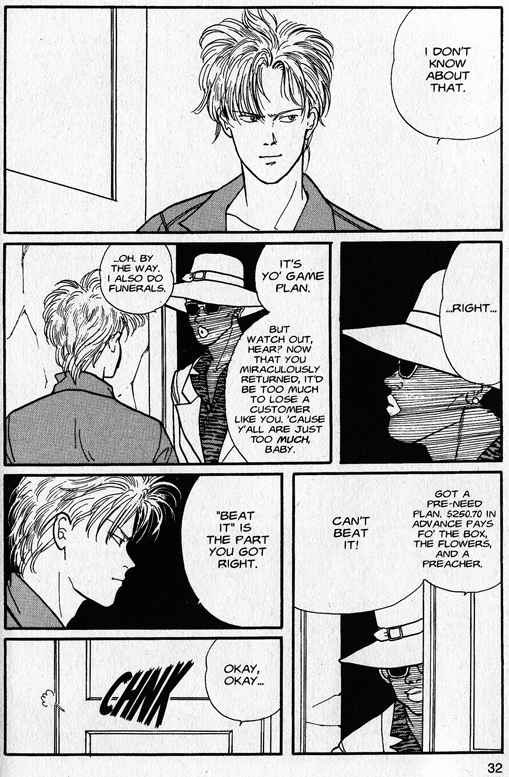
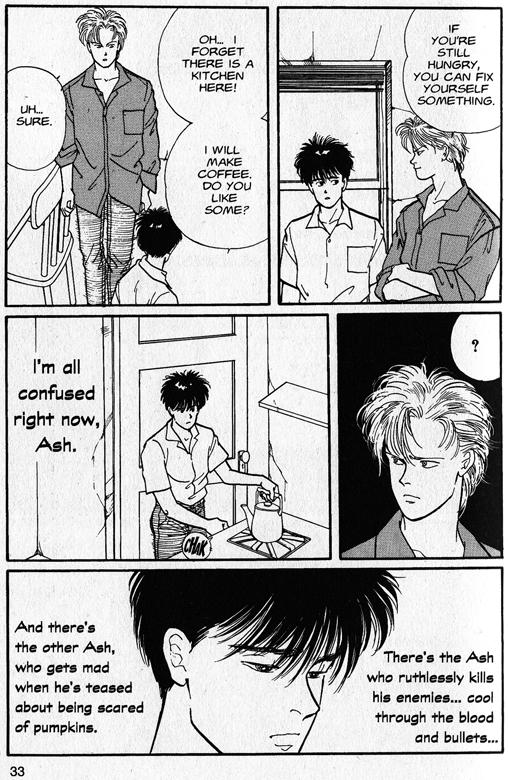
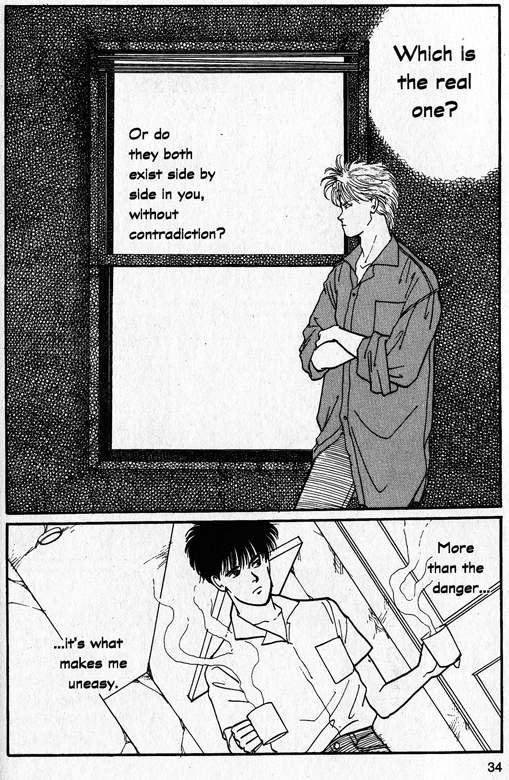
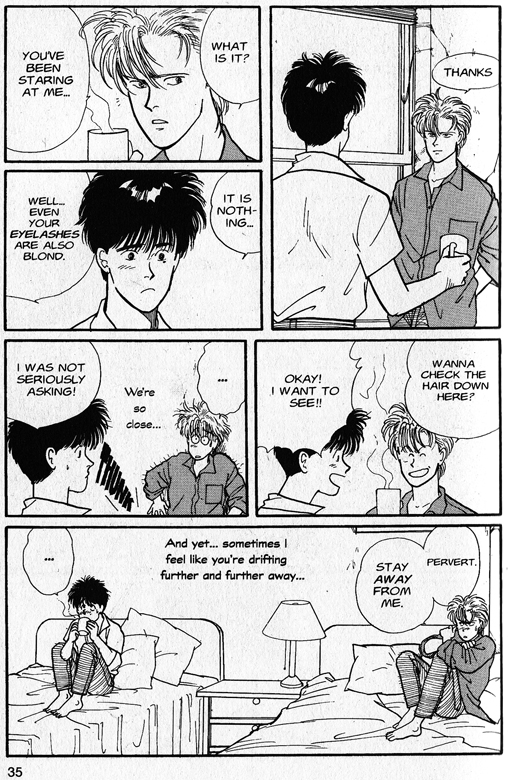

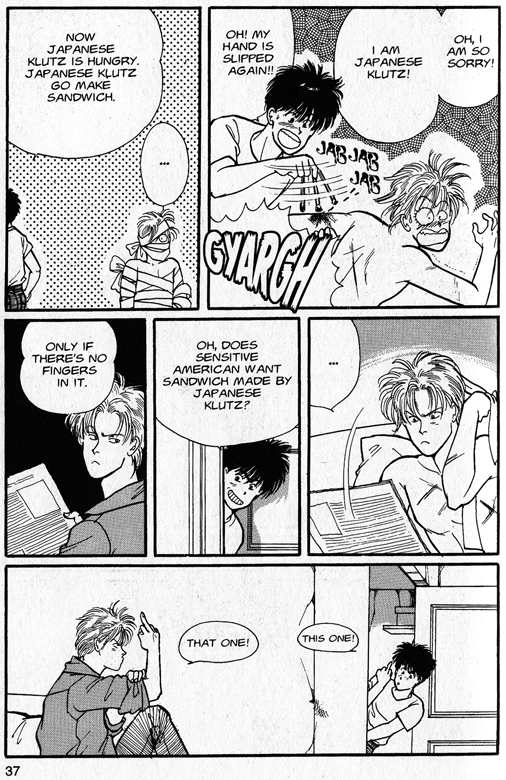
I die. I die from Eiji suddenly making jokes in English, and teasing a guy who everyone else in the freakin’ city is deathly afraid of. It is just the dearest thing ever, and has changed the whole tone of this for me. I mean, I knew they were going to get close, and I’ve seen a few panels from later on in the manga. But this sweet, unforced humor has just killed me dead.
I think that’s what I’m really trying to get across here. Sure, this story is about street gangs, organized crime, blah blah blah, but what it is really about is this relationship between Ash and Eiji, and how it changes them both throughout the course of the series. If you love BL manga, or if you don’t love BL manga but wish you did (as I’ve lamented before), I can’t recommend this series enough. I finished volume 19 (and the post-series one-shot, Garden of Light) months ago, and it still sticks with me, the story of these two, haunting the back of my mind in some way all the time.
I said back when I was begging for BL recommendations, “My husband once asked me, ‘Is Banana Fish yaoi?’ and my immediate response was, ‘I wish’. . . What I meant was that I wish I’d ever read a boys’ love manga as interesting and well-plotted as Banana Fish.” I’ll take that a step further. I wish I’d read more manga in general as interesting and well-plotted as Banana Fish, and I read a lot of manga. The current editions from Viz are utilitarian and (according to a friend of mine who has the first seven volumes from Viz’s original flipped edition) censored , but despite the fact that there is something truly ridiculous about the leader of a NYC gang repeatedly saying things like, “When the fudge hits the fan,” none of this really matters once things get going. I’ve rarely found a series that has engaged me so deeply, so fast.
Yes, it’s melodramatic and weirdly dated (set in the 80’s, it manages to feel like it is actually set in the 50’s half the time). Yes, the author’s idea of NYC street gangs is kind of hilarious. I could even suggest that, for a manga that is very obviously telling a love story between two men, it is surprisingly homophobic at times. But above all that, the love story itself shines with warmth and uncommon beauty.
Banana Fish has carved a permanent place for itself in my consciousness, and so I offer the same to you.
Well, I blame you for the fact I’m already on volume 8 and waiting for the next lot to arrive! *lol* Thanks for the reccomendation, I’m enjoying the series :)
I will happily accept that blame! :D
I’m so glad you’re enjoying it, and thanks for letting me know!
Yes, I fully agree.
I begun reading Banana Fish back around 2001 for none specific reason. To be honest, I first thought: “What a crap. These drawings are the most ugly thing I’ve ever seen.” But I get a sneak peak on the storyline and for some reason, I started to read. I read the first seven volumes out in Germany, than they cancelled the series (I even don’t know why…) and it was HELL waiting for volume 8 to get released in US, so I could import it in a language I understand. I finished with volume 19 US. I never loughed, cried, mourned so often while reading anything (besides novels from hugo and Dumas maybe). I gone through the whole spectrum of human emotions. I seriously LOVED Ash and Eiji. I identified so much with Ash, I began using him as a RPG-Character and I could never let go on him. He ist inspiring til today. I HATED Foxx and Marvin. I adored Blanka and I felt something for Yut Lung, I can’t describe. I stucked on Yoshidas work, I found something nearly as good as Banana Fish in Yasha. And I went on. I bought Artbook, the side story volumes and even the satge play and the novels in Japanese (even I can’t understand a thing). I evben started to learn Japanese just for this story.
Seariuosly: I’ve you once find your way to banana Fish, it never let you got. It’s a drug, really ^^
I am sad to say that I have overlooked Banana Fish a couple times over the years, but I believe all things happen for a reason. I just have to believe that I wasn’t ready for Banana Fish until now and I have to agree with you. This manga will forever be with me and I will always keep coming back to it, and will continually cry over it and laugh with these characters forever. I thank God for Banana Fish and its mangaka.